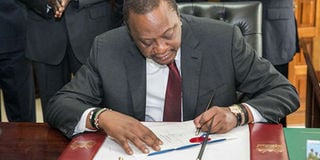Growing debt burden: Kenya needs German-style financial discipline

President Uhuru Kenyatta assents to the Finance Bill, 2018 and Coast Guard Service Bill at State House, Nairobi, on September 21, 2018. PHOTO | SAMUEL MIRING'U.
What you need to know:
- Now both President and Mr Odinga must rethink political strategy in the face of the mountain of debt and unpopular taxation.
- A recent opinion survey showed that Kenyans regard China, which owns more than 70 percent of Kenya’s bilateral debt, as a serious threat to their economic stability.
On February 4, I wrote here that a runaway debt and its effect on the national economy and politics, the manoeuvring of Mr Raila Odinga, the Big Four and the presidential succession would shape President Uhuru Kenyatta’s legacy and not merely his last term and Cabinet.
With the Treasury projecting that Kenya’s national debt will be upwards of Sh7 trillion at the end of Mr Kenyatta’s term, it appears the President will spend the next four years juggling the balls of succession, Big Four and economy from a trick bag dominated by debt, China and Mr Odinga.
On March 10, I revisited the matter of the national arrears and wrote that even as government insisted it was managing the debt efficiently, it was in a financial hole.
But, instead of quitting digging it came across as a tax-and-spend, borrow-and-spend, borrow-to-pay debt and borrow-again government.
Not surprisingly, government has announced austerity measures, introduced new taxes and, had Parliament slash its budget by some Sh5 billion in order to live within its means.
But, as I asked in March, will it stop digging or, put another way, will it start living within its means?
TAXES
Obviously, it will not. Increasingly the taxman is finding it hard to meet his targets and which is why Treasury is projecting that a government that inherited a Sh1.9 trillion debt in June 2013 accumulated over 10 years will have increased that by nearly six times over the same period.
Of course the government does not have money; it is parasitic on the public.
So it is taxing the public to stay afloat and so it is borrowing because the public will pay.
But the government got a taste of what the public is thinking when it rose spontaneously against a 16 percent VAT on fuel.
State House reduced the VAT on fuel to eight percent but then what it gave with the right hand it snatched with the left because it introduced a raft of other taxes to plug the hole or holes in its budget.
It is why Kenyans on social media have nicknamed the President Ushuru (tax).
CHINA
Mr Odinga was not spared; some of his own party MPs voted against the taxes introduced much to the chagrin of the President’s fiercest foe turned strongest ally.
Now both President and Mr Odinga must rethink political strategy in the face of the mountain of debt and unpopular taxation.
And they must factor into this thinking the fact that a recent opinion survey showed that Kenyans regard China, which owns more than 70 percent of Kenya’s bilateral debt, as a serious threat to their economic stability.
Secondly, this view would appear to be reinforced by the fact that Chinese firms in January took over the Sri Lankan port of Hambantota after Colombo failed to meet its debt obligations; and recent news that Lusaka is in debt distress and the Chinese may take over Zambia’s public energy firm.
Thirdly, because Kenyans expect that the government will borrow more from the Chinese to complete the second phase of the Standard Gauge Railway, the politics of loans and taxes will be made even more toxic and octane when mixed with the politics of Kenyatta II succession.
ELECTION
Yes, as they say at Westminster, all politics is local. If Chinese loans will distress Kenyans, or if it is perceived that they have caused Kenyans suffering, then debt will be a factor in the 2022 General Election.
With Mr Kenyatta out of the running, Deputy President William Ruto and Mr Odinga will be in the firing line of the electorate.
However, Kenyans need a new approach to debt. Let us look at the German view of debt. According to Prof Marcel Fratzscher of Germany’s Economic Research Institute, it is crucial to note that the German word for debt is schuld and the German word for guilt is schuld.
In a 2015 interview with the BBC, Prof Fratzscher explained that “to get into debt you have done something bad and that describes the German peoples attitude quite well."
The German way, he says, is to “save now, have later” rather than “have now, pay later” and that he reminds “is not just the older generation talking.”
And Germans fear inflation. Inflation is the enemy of savers yet saving is the German way.
Kenya needs self-imposed German-style financial discipline.





